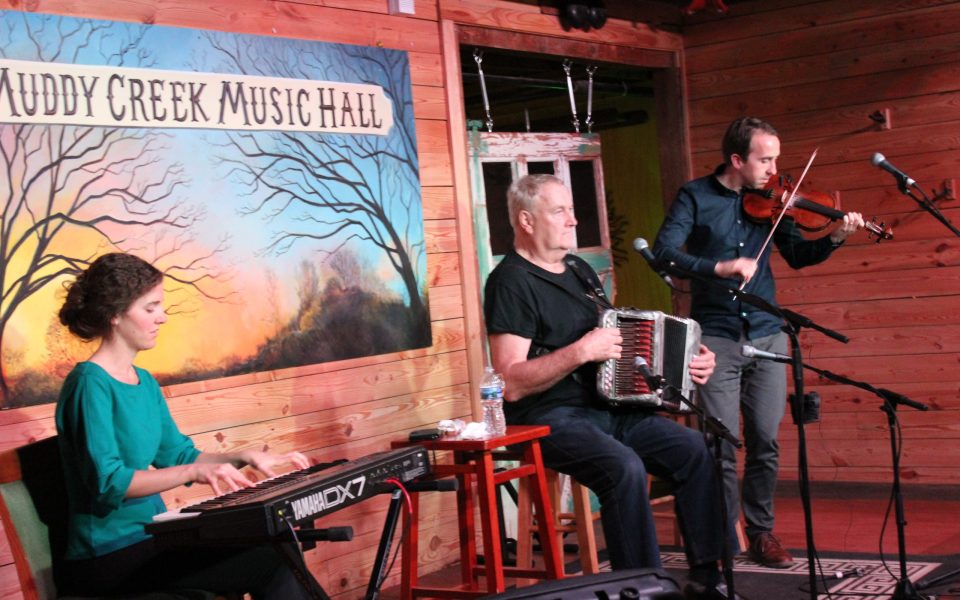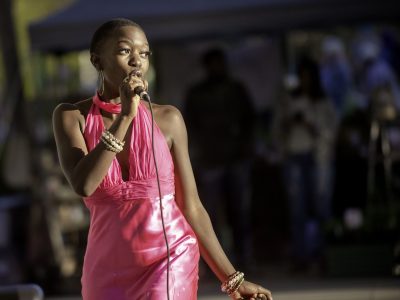It’s the kind of music that makes you want to dance, and has for 200 years.
The sweet whine of the fiddle merged with the swells of the accordion as Samantha Harvey jumped up from behind the keyboard and began to tap her heels on the wooden stage. And while none of the audience members followed suit, they began to stomp their feet, causing the floor of the music hall to shake.
The concert had been organized by Fiddle and Bow, a Triad folk music organization, and drew folk music enthusiasts to Muddy Creek Music Hall in Bethania near Winston-Salem on a warm Sunday afternoon. Members of the crowd sipped their ales and stouts while others clapped their hands as a trio of musicians performed on stage.
“You don’t have to be quiet for these next few songs,” encouraged Oisín Mac Diarmada, a renowned fiddler from Ireland who’s won championships for his prowess. He played the instrument with finesse, moving his bow swiftly across the strings as he tapped his feet and swayed back and forth. Nearby, Harvey stamped along to the music, her heels leaving marks on the stage.
Completing the trio, in the center of the stage sat Seamus Begley, another seasoned musician from the Irish folk-music circuit, who bounced his knees up and down as he plugged away at the accordion strapped to his chest.
The group played a variety of folk songs, switching between upbeat barn dances and melancholic ballads.
As Begley, the only one of the group who sang, crooned in Irish, his voice filled the room, transporting listeners and warming the already cozy atmosphere.
One woman, who wore a thin red sweater and sat in the front row, wiped away tears as she listened. The man sitting next to her mouthed the words and sang along.
“There’s a lot of history in this music,” explained Sonny Thomas, the co-founder of the Fiddle and Bow. “The melodies in folk music are very beautiful. A lot of classical composers felt the same way and drew inspiration from traditional music too.”
Thomas and co-founder Bill Stevens modeled Fiddle and Bow after a similar nonprofit in the Triangle and formed the organization in the eighties as a way to bring folk musicians to the area.
Defined as music that spans generations by oral tradition, Thomas says folk music plays a key role in helping us understand cultures of a different time.
“Old songs or ballads are reflections of the time they were written,” Thomas said. “Through the songs, you can learn what people were interested in 200 years ago.”
While the songs may be old, many of them seemed to reflect values and stories that are still relevant today. Nostalgic tales of love to those of loss and forgotten childhood memories captured the audience while dances with upbeat melodies produced yips and hoots from the musicians as they played.
Despite its relevance however, Thomas says they’ve had a hard time keeping people interested in folk music.
“The market is not huge for folk music,” Thomas said. “In our almost 38-year history, we’ve struggled to get people out. The audience is older. Many of us became fans in the sixties during the folk revival. Somehow the music isn’t attractive to young people.”
But, he says, he hopes that the musicianship and the storytelling bring in those who have a love for simple, good music.
“I think people think folk music died in the 1970s,” he said. “But it didn’t die, it just changed. Come give us a try.”
And even if you can’t dance, you can at least stomp and clap along.
Join the First Amendment Society, a membership that goes directly to funding TCB‘s newsroom.
We believe that reporting can save the world.
The TCB First Amendment Society recognizes the vital role of a free, unfettered press with a bundling of local experiences designed to build community, and unique engagements with our newsroom that will help you understand, and shape, local journalism’s critical role in uplifting the people in our cities.
All revenue goes directly into the newsroom as reporters’ salaries and freelance commissions.





Leave a Reply